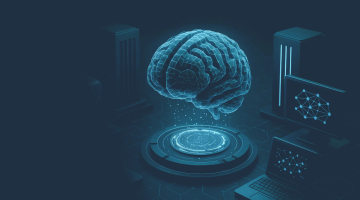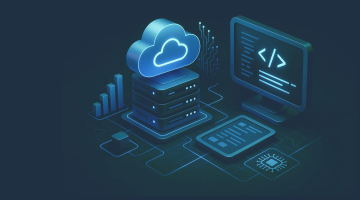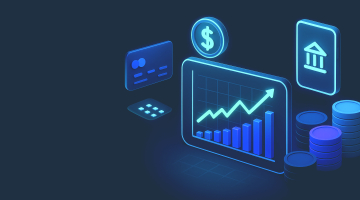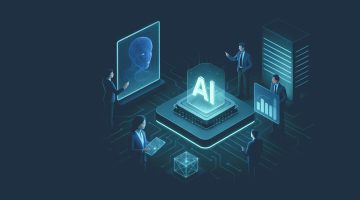
Artificial intelligence companies in healthcare 2026
There is no modern vertical that doesn’t leverage AI technology to reinvent both its internal pipeline and client-facing workflows. The medical industry is one of such realms where artificial intelligence, machine learning, computer vision, natural language processing, and other disruptive know-how make the difference, dramatically improving healthcare delivery. However, being top-notch experts in their field, medical professionals and healthcare providers can’t embrace AI-powered tools without qualified assistance from software development vendors.
This article will help you find a competent partner among IT outsourcers by showcasing the role and use cases of AI in healthcare, enumerating key parameters that influence the choice, recommending top AI companies in healthcare, and outlining the current trends in the ongoing healthcare revolution related to the application of artificial intelligence.
Searching for AI experts? Check out our AI consulting services.
AI in the healthcare industry: An overview
For centuries, medicine has relied on human intuition and the encyclopedic knowledge of healthcare professionals. However, with the exponential growth of health data and the number of people in need of treatment, doctors and hospital staff can’t perform their duties on a high level without the assistance of IT technologies, where AI-powered platforms carry the day in the early third millennium.
The advent of the most primitive artificial intelligence software began in the 1980s when rule-based expert systems came into play to handle patient records. Having started small, technology has evolved into a full-fledged game-changer for health systems. Machine learning algorithms and NLP tools are bringing positive changes to multiple areas of clinical routine, such as analyzing patient data and medical images, diagnosing diseases, managing clinical documentation, enhancing patient care, and improving patient outcomes.
Given such weighty boons, it is no wonder that healthcare organizations adopt AI-driven software on a growing scale, with about a fifth of them harnessing AI initiatives as of 2021, and this number is sure to have increased since that time. We can draw such a conclusion by looking at the surge symptomatic of the AI healthcare market, which was worth around $11 billion back then and is predicted to approach $188 billion by the decade’s end.
Let’s see how the domain uses AI in healthcare operations.
Explore our development services for healthcare.
Applications of artificial intelligence in healthcare
What are the major areas where healthcare companies employ AI-fueled solutions?
AI use cases in healthcare
Establishing medical diagnosis
To improve patient outcomes, doctors should notice early signs of diseases, which is crucial for cancer treatment and battling various chronic diseases. AI algorithms assist healthcare professionals in early disease detection by performing fast analysis of remote medical imaging and lab test results, which increases diagnostic accuracy, provides actionable insights for proactive interventions, and paves the way for devising personalized treatment plans.
Managing medical documentation
Contemporary healthcare systems rely heavily on electronic health records (EHR). Over time, these collections of medical records grow into massive databases, and searching for the necessary information becomes challenging. AI software can find specific details in a patient’s medical history lightning-fast, elevating medical notetaking, storing, and retrieving to a new level, thus enhancing workflow efficiency tremendously.
Boosting patient experience
Improved patient outcomes are impossible without a smooth patient experience at all stages of patient interaction with the healthcare facility. AI-driven healthcare chatbots are among the innovative solutions that enhance patient communication with hospitals and serve as advanced support channels in chronic disease management and remote patient monitoring, allowing people to obtain consultations and recommendations without hospital visits.
Stepping up drug discovery
The immense predictive analytics power of AI-fueled solutions allows pharmaceutical companies and medical research institutions to design new drugs with predicted characteristics or side effects and select appropriate audiences for holding clinical trials of newly manufactured medicines.
Augmenting healthcare facility management
Modern hospitals are complex organizations, running which is a job of work for the administrative personnel. AI-based hospital management systems are excellent tools that help streamline clinical workflows across multiple aspects of the facility’s operation, including patient and employee management, controlling insurance and finances, administering nurse stations, taking care of the inventory and laboratories, managing medical notes, and more.
Healthcare institutions can enjoy all these perks by implementing bespoke AI software developed by a competent vendor. How can you choose one for your project?
Selecting an AI development company: factors to consider
While combing through the medical AI software development market, you should keep your eyes skinned for the following aspects.
Factors to consider when choosing AI development company
Experience and expertise
The longer the company is present in the niche and the more projects it has delivered, the greater its employees’ skills in tackling such tasks are. Pay attention to specialized certificates that prove their qualifications.
Relevant cases in the portfolio
You can’t hope to obtain a high-end healthcare product from a company that has completed projects for other verticals under its belt. Moreover, while analyzing the vendor’s portfolio, you should look for similar case studies to the one you plan to implement.
Tech stack
Crafting AI solutions requires wielding disruptive programming languages, frameworks, tools, and methodologies. Make sure the vendor mentions them among its technological arsenal, and that the delivered projects confirm their mastery.
Testimonials and reviews
Customer satisfaction is the key benchmark for gauging the quality of services. You can learn about it from reviews on rating resources (for instance GoofFirms and Clutch) or from client testimonials the vendor places on its site. To make doubly sure, contact ex-customers and learn how they enjoyed the cooperation process and the deliverables it has yielded.
Armed with this information, you can get down to vendor selection hammer and tongs.
Top 10 healthcare AI companies to choose from
Since dozens, if not hundreds, of IT outsourcers operate in the AI healthcare development niche, the selection process may turn into a lengthy and tedious ordeal. We will narrow your choice to the 10 best companies that are universally recognized leaders in the area.
DICEUS
Throughout the 15+ years of our presence in the software outsourcing market, healthcare solution development has been our primary focus. Our 250 full-time professionals excel at crafting top-notch healthcare products, including EHR and EMR software, hospital management systems, telemedicine solutions, healthcare mobile apps and data warehouses, healthcare data analytics software, medical device solutions, you name it. Besides, they offer the best-in-class consulting services regarding digital transformation in the industry, help desk organization, HIPAA compliance, managed IT services, and more.
Top healthcare AI companies
DICEUS’s expertise in the healthcare realm is accompanied by our competence in the artificial intelligence field with a proven track record of numerous delivered projects. We are well-versed in AI integration, custom AI development, AI mobile app development, generative AI creation, etc. Our vetted experts can train LLMs, integrate ChatGPT, implement NLP technology, and render any other service in the AI domain.
With offices and development teams spread across eight countries and three continents, we can stay connected with customers from any time zone 24/7. The combination of flexibility in cooperation with partners, high quality of delivered solutions, and commitment to innovation makes DICEUS the number one choice for a reliable and versatile AI development vendor.
Enlitic
The company’s forte is its AI-driven image recognition solutions in the realm of radiology. By leveraging deep-learning algorithms, they can analyze and interpret data in medical images quickly and accurately. Uniting their efforts with Laitek, Enlitic ensures smooth medical imaging data migration, thus enhancing radiologists’ pipeline.
Oxipit
This Lithuanian company has a similar focus. It has launched an AI-powered double-reading medical imaging tool called ChestEye that analyzes chest X-ray images in reports, identifies errors, and pinpoints missed findings. In cooperation with Astra Zeneca, Oxipit deployed its software in two largest clinics of Lithuania, where it has detected 190 overlooked issues among 50,000 images, presenting potential threats to patients’ health.
SmarterDX
The platform created by the company is also geared towards identifying oversights but works with medical records instead of images. AI mechanisms behind the tool automatically analyze diagnoses that aren’t vindicated by evidence-based findings and exclude them from billing unless healthcare providers validate them.
Pieces
Its generative AI tool is used by physicians and nurses to draft, chart, and summarize clinical notes and patient interviews. It produces the patient’s overview updated from the latest EHR records in real-time. Such a solution is a great time-saver, allowing healthcare providers to minimize documentation errors, track patient discharge barriers, and improve billing.
AITRICS
The vendor pioneered an AI-driven clinical decision support system, enabling doctors to monitor the patients’ conditions in real-time. Being integrated with the hospital’s EHR database, it creates a 360-degree view of the person’s health that can be tracked from the interactive dashboard, where all relevant data is assembled and visualized.
Teledoc Health
Automatic creation of medical documentation is the major use case of the Teledoc Health Solo platform. Such conversational and ambient records are produced during patient examinations and can be shared with authorized specialists. Besides, thanks to the product’s predictive AI model designed in cooperation with Microsoft Azure OpenAI Service and Azure Cognitive Services, it can forecast diabetes risks and take steps to forestall the disease’s development.
Atomwise
This is a San Francisco-based company that has launched its AtomNet technology for drug manufacturing. Being grounded on convolutional neural networks, the solution can sift through the database of 3 trillion synthesizable compounds to predict which medicines containing specific molecular structures will work for treating certain diseases.
Medtronic
The company is famous for its GI Genius endoscopy module powered by computer vision technology. During the colonoscopy procedure, it scans the intestine to identify colorectal polyps and lesions that otherwise stay unnoticed even by a trained human eye.
Ada Health
This German startup developed a self-assessment Platform as a Service solution that has eventually evolved into a mobile app. It is honed to understand reported symptoms, match them with the database containing symptoms of people with similar demographics, and inform about the likelihood of a certain condition. Being available in 7 languages, the app has become a notable tool in population health management for its 14 million-strong user audience.
Whatever partner for your AI-based project you choose, it is essential to make sure the company keeps abreast of the current developments in the niche.
Emerging trends in AI for healthcare
We at DICEUS monitor the AI healthcare market to stay in the know of the trends that, having appeared recently, are likely to dominate the industry for years to come.
Trends in AI healthcare
Personalized medicine
A one-size-fits-all approach will increasingly give way to tailored care based on the individual’s genetic makeup, unique allergies and drug susceptibilities, lifestyle variables, environmental influences, etc. Powerful AI algorithms can analyze all these factors and help clinicians come up with a one-of-a-kind treatment plan that will guarantee the best patient outcome.
Democratization of access to healthcare services
As the forward-looking AI developers start to integrate their healthcare tools with major operating systems (iOS and Android), an enormous mobile phone user audience gets greater opportunities to apply for remote medical services, evaluate their condition via virtual health assistants, receive relevant recommendations, and stay in touch with specialists wherever either party to the healthcare process is located.
Medical robots
These can come in handy in numerous use cases. The more primitive transport robots and drones can autonomously deliver medical equipment and supplies, whereas smarter solutions are likely to replace human personnel in performing more complex and sophisticated medical manipulations (examinations, surgeries, patient monitoring, rehabilitation procedures, and more).
Cybersecurity
When entrusting their personal and financial data to healthcare organizations, people want to know it won’t be tampered with. To protect patient privacy and provide inviolability of their IT infrastructure, hospitals and clinics will employ AI cybersecurity mechanisms that will keep their digital perimeter under lock and key by detecting potential threats, forestalling penetration attempts, and running a tight ship concerning data and system access.
Conclusion
Cutting-edge AI-based tools have significantly reshaped the way healthcare specialists diagnose, treat, and monitor the state of patients. They are extremely helpful in managing health data and medical documentation, keeping in touch with remote patients 24/7, administering internal hospital pipelines, improving drug discovery, performing surgeries and examinations, and more.
To create a custom healthcare solution tailored for your unique use case, you should choose a competent AI company with a great experience in the healthcare domain, whose software engineers can wield the innovative tack stack and have a proven track record of successfully delivered projects in the niche.
Frequently asked questions
How is AI transforming the healthcare industry?
Thanks to the advent of machine learning, natural language processing, computer vision, and other AI-driven technologies, healthcare providers can streamline and facilitate medical data analysis, optimize administrative workflows at hospitals, revolutionize health record management, increase diagnostic accuracy, and improve patient outcomes.
What are some notable achievements of leading AI healthcare companies?
The leaders of the AI healthcare market have launched numerous software products that improve the quality of reading medical images, monitor diagnostic accuracy across EHR, automatically create medical documentation, streamline manufacturing drugs with predicted characteristics, register anomalies during endoscopic examinations, provide patient self-assessment, and more.
How do AI technologies improve patient care and outcomes?
Being armed with AI-fueled tools, doctors can establish accurate diagnoses much faster, quickly access any relevant information from a person’s medical history, design a tailored treatment plan that takes into account the patient’s demographics, genetic peculiarities, allergies, susceptibilities, etc., and monitor their condition remotely in real-time, giving recommendations during online consultations.
What future trends can we expect in AI healthcare?
Today, we are witnessing emerging trends concerning the expansion of access to AI technologies, the growing personalization of medical care, the increasing role of AI-powered chatbots and virtual health assistants, the augmenting predictive capabilities of AI-fueled medicine, the advent of intelligent robots on a large scale, the introduction of AI-based clinical decision support systems, the surge of advanced medical data analytics, and more.





